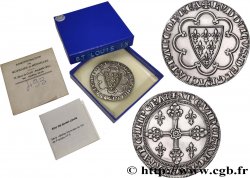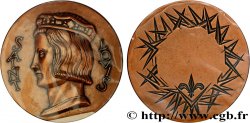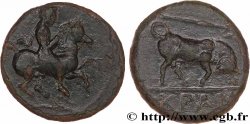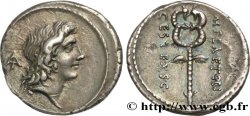Obverse
Obverse legend : + LVDOVICVS REX (X CANTONNÉE DE QUATRE POINTS) ; LÉGENDE EXTÉRIEURE : + BNDICTV: SIT: NOME: DNI: NRI: DEI: IHV. XPI, (PONCTUATION PAR TROIS BESANTS SUPERPOSÉS).
Obverse description : Croix.
Obverse translation : (Louis roi ; Que le nom de notre seigneur Jésus-Christ soit béni).
Reverse
Reverse legend : TVRONVS CIVIS.
Reverse description : Châtel tournois sommé d'une croisette ; bordure extérieure de douze lis.
Reverse translation : (Cité de Tours).
Historical background
LOUIS IX OF FRANCE CALLED SAINT LOUIS
(03/11/1226-25/08/1270)
Son of Louis VIII and Blanche de Castille, born in Poissy in 1214, Louis IX ascended the throne in 1226 at the age of twelve. During the first fifteen years of his reign, the government of the kingdom was actually exercised by his mother, who fought successfully against the successive coalitions of the great feudal lords.. By the Treaty of Paris of April 1229, the Count of Toulouse Raimond VII definitively abandoned the seneschalsy of Beaucaire and Carcassonne to the king.. As for the King of England, Henry III, who gave his hand to the rebellious barons, he was defeated several times.. Crusader in 1244, Louis IX left Aigues-Mortes in 1248, wintered in Cyprus and took Damietta in Egypt in 1249. Beaten at Mansourah (February 1250), he had to leave Egypt and spent four years in Syria (1250-1254), organizing the fight against the Turks. The second part of the reign was more peaceful. The king founded the Quinze-Vingt hospital, built the Sainte Chapelle, reformed the institutions and the administration (gradual formation of the parliament, creation of large bailiwicks). He then took on the stature of a European arbiter: between the Pope and the Emperor, between the claimants to great feudal successions, between the King of England and his vassals.. The 1259 peace treaty put an end to the "first hundred years war" waged for a century against the Plantagenets: Henry III of England renounced Normandy, Anjou, Touraine, Maine and Poitou. He recognized himself as the liege man of the king for Guyenne and the provinces which were returned to him (Limousin, Périgord, Quercy, Agenois, Saintonge). He crossed paths for the second time in 1267 and left Aigues-Mortes in 1270 to conquer the kingdom of Tunis.. It was in front of this town that he died of the plague on August 25, 1270.. A pious prince but in an imperious mood, Saint Louis preserved his authority from the attacks that the Holy See could have brought him.. King and saint, he was canonized in 1297 and his century quickly appeared as a golden age of medieval France.. Under his reign, the University of Paris had become the intellectual heart of Christianity, the French language and architecture spread throughout Europe.. While Frederick II, his contemporary, failed to revive the imperial mystique, with Saint Louis the French monarchy took a preeminent position in Europe.. "The King of France writes Mathieu Paris, is the king of the kings of the earth. "From now on, he was, more than the emperor, the image of the prince par excellence. This preponderance and this prestige would last until the end of the monarchy.. From Marguerite de Provence, married in 1234, Louis had six sons and five daughters. The eldest, Louis, died in 1260, the second, Philippe, succeeded him under the name of Philippe III.








 Report a mistake
Report a mistake Print the page
Print the page Share my selection
Share my selection Ask a question
Ask a question Consign / sell
Consign / sell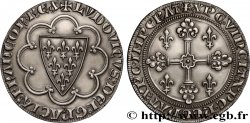
 Full data
Full data